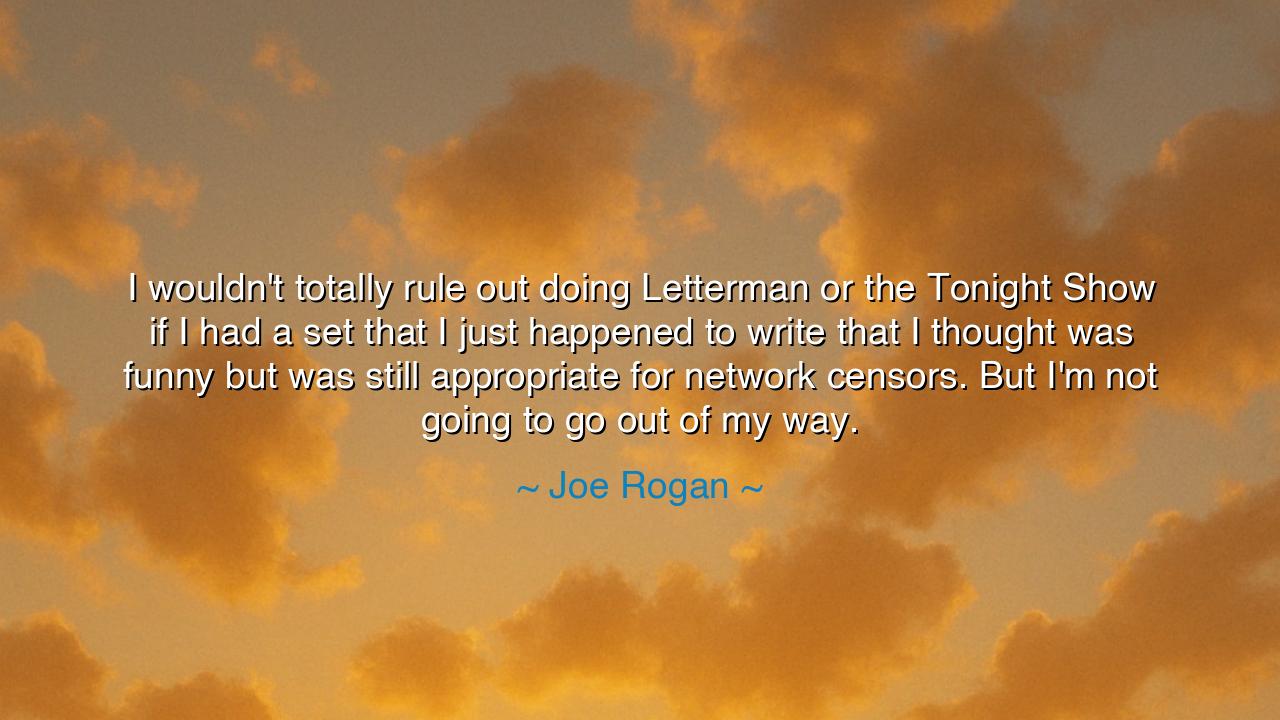
I wouldn't totally rule out doing Letterman or the Tonight Show
I wouldn't totally rule out doing Letterman or the Tonight Show if I had a set that I just happened to write that I thought was funny but was still appropriate for network censors. But I'm not going to go out of my way.






“I wouldn’t totally rule out doing Letterman or the Tonight Show if I had a set that I just happened to write that I thought was funny but was still appropriate for network censors. But I’m not going to go out of my way.” — so spoke Joe Rogan, the comic philosopher of the modern age, whose words, though wrapped in casual speech, carry the ancient weight of freedom, authenticity, and the refusal to bow before conformity. Beneath his easy tone lies the declaration of a man who values truth over applause, integrity over visibility. In his reflection, we hear the timeless struggle of the artist: the balance between the inner voice and the outer world, between the call of the crowd and the call of the soul.
When Rogan speaks of the Tonight Show and Letterman, he invokes the great temples of American comedy — places where countless artists once went to prove themselves before the high priests of popular culture. To appear there was to be crowned with validation, to be seen and celebrated by millions. Yet Rogan, with quiet defiance, steps aside from that altar. His words are not rejection, but revelation. He understands that true art cannot breathe in cages, even if those cages are gilded with fame. For what use is laughter, he asks, if it must first be filtered through the hands of censors? What worth has a voice if it cannot speak freely?
The ancients knew this same struggle. In the time of Socrates, there were those who demanded that he soften his speech, to make his ideas palatable to the crowd. But he refused, saying, “The unexamined life is not worth living.” Like Rogan, Socrates chose authenticity over approval. He would rather be condemned for truth than celebrated for compromise. Rogan’s words echo this old courage — the wisdom of one who understands that art diluted for acceptance ceases to be art at all. The comedian, like the philosopher, must speak the whole truth, even when the world demands silence.
When Rogan says he might perform only if he “just happened to write” something fit for television, he reveals his allegiance not to opportunity, but to inspiration. He will not chase the moment; he will wait for it to arise naturally. The ancients would have called this alignment with the Muse, the trust that what is true and timely will come unforced. For creativity that is born of calculation is lifeless; but creativity that flows from authenticity carries the spark of eternity. Rogan teaches, in his modern idiom, what the old poets lived: that the artist must serve his vision, not his vanity.
His mention of network censors brings forth another lesson — that every age has its guardians of propriety, its gatekeepers of thought. In ancient Rome, the poet Ovid was exiled for words deemed unfit for imperial ears. In every generation, those who speak too freely risk the wrath of power. Yet it is the duty of the artist, as of the truth-teller, to test the boundaries of what can be said. Rogan’s awareness of censorship is not complaint, but recognition of the ancient game — that freedom always has its cost, and that to live honestly is to walk that line with courage.
When he says, “But I’m not going to go out of my way,” he speaks the language of the self-sufficient man. He has already found his path, and does not hunger for validation beyond it. The ancients would have called this autarkeia — the virtue of self-completeness. The philosopher Epicurus taught that the wise man does not chase honors, for they enslave the soul. Rogan, in his own way, lives this wisdom: his art exists not to please the powerful, but to express the truth as he sees it. Whether the world listens or not is no longer his concern.
And so, from this modern utterance, we may draw an ancient lesson: Do not sacrifice your truth for the sake of acceptance. The applause of the crowd is fleeting, but the peace of authenticity endures. Whether you are an artist, a thinker, or a worker in any craft, let your work spring from conviction, not concession. Create not to be invited, but because something within demands expression. Speak freely, live truthfully, and trust that the right audience — those who see, those who understand — will find you.
For in the end, as Joe Rogan reminds us, the true artist does not go out of his way to seek approval. He walks his own way. And in doing so, he joins the company of the ancients — those who dared to speak without permission, who chose the truth of the soul over the comfort of conformity. Freedom, after all, is the purest stage, and the only one worthy of performance.






AAdministratorAdministrator
Welcome, honored guests. Please leave a comment, we will respond soon